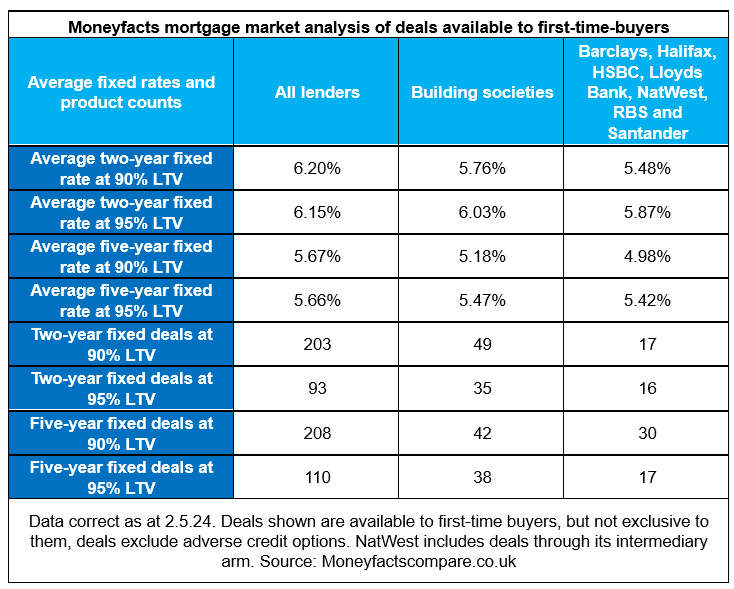Mutuals generally offer more competitive rates than high street banks, data shows

Building societies in the UK have been providing significant support to first-time buyers – a group for whom affordability has reached its most challenging level in decades, data from Moneyfactscompare.co.uk has revealed.
According to the price comparison site, mutuals are spearheading new financing products aimed at first-time buyer’s entry into the housing market.
Key offerings include Skipton Building Society’s Track Record mortgage, Yorkshire Building Society’s £5,000 deposit mortgage, and a collaborative initiative between Leeds Building Society and Experian, designed to help boost consumer credit scores.
Comparative analysis indicates that building societies generally offer more competitive rates than high street banks for first-time buyers, particularly in two- and five-year fixed mortgages at both 90% and 95% loan-to-value ratios.
While the seven largest high street banks – Barclays, Halifax, HSBC, Lloyds Bank, NatWest, RBS, and Santander – typically provide lower average rates, these might not represent the best value when considering all associated costs and incentives, Moneyfacts said.

“Building societies offer competitive packages for first-time buyers and continue to support those who are the life blood of the mortgage market,” commented Rachel Springall (pictured left), finance expert at Moneyfactscompare.co.uk. “Mutuals which offer two- or five-year fixed rate deals available to first-time buyers with a 5% or 10% deposit currently charge less on average compared to the market average in the same space.
“However, the biggest high street banks offer some of the lowest fixed rates in the same sectors, and indeed seven banks are priced lower, on average, than mutuals. High street banks traditionally have more margin to price their mortgages lower, but the lowest rate deal may not be the best choice when all the costs and incentives associated with the mortgage are included.
“Saving money on the upfront cost of a mortgage is incredibly important for first-time buyers who may have exhausted their cash on a deposit, legal fees and moving costs.”
“The key challenge for first-time buyers is affordability, with interest rates higher than they may have expected this year, and affordable housing remaining in short supply.”
Paul Broadhead (pictured right), head of mortgage and housing policy at the Building Societies Association, remarked on the historical context.
“Becoming a first-time buyer is possibly the most expensive it has been over at least the last 70 years, but a properly functioning housing market is dependent on first-time buyers being able to afford their first home,” he said.
“Mutuals have made various efforts to be innovative,” Springall added. “Even with such innovation, a recent study by Coventry Building Society for Intermediaries noted ‘regional differences are acting as barriers’ to those looking to step onto the property ladder for the first time.
“Any borrower looking to get their foot on the property ladder would be wise to seek independent advice to ensure they find the right deal for them.”
Want to be regularly updated with mortgage news and features? Get exclusive interviews, breaking news, and industry events in your inbox – subscribe to our FREE daily newsletter. You can also follow us on Facebook, X (formerly Twitter), and LinkedIn.



